- Home
- Tim Powers
The Bible Repairman and Other Stories Page 6
The Bible Repairman and Other Stories Read online
Page 6
The bald man at the computer monitor stared at the red dot on the map-grid. “I don’t –”
“Look out the window,” said Hartford Evian with exaggerated clarity.
“Oh, right.” Scarbee got up from the computer and crossed to the tinted window that overlooked Anaheim Boulevard, and peered down. “He’s just sitting on his motorcycle, with his helmet off.” He rubbed his nose. “It’s raining.”
“Was this visit on the schedule?”
“I suppose so. Why should they show me the schedule? It must have been.”
Evian had flipped open a cell phone and begun awkwardly punching numbers into it, when Scarbee added, “Now Kokolo just drove in.”
Evian swore and quickly finished pushing the tiny buttons.
“Perry,” he said a moment later, “don’t look at the guy on the motorcycle to your right, it’s Hollis. Hollis. Yes, that one. It’s not on any schedule I ever saw. Just walk in, ignore him.” After listening for a moment, he went on, “Wait, wait! Felise is with you? Tell Felise not to get out of the car!”
Scarbee was still looking out the window. “Felise is already out of the car,” he said.
“Get in here, both of you, quick, don’t look around,” said Evian, and then he snapped the phone closed. “Did Hollis look at her?”
“Well,” said Scarbee, “he looked over at both of them.”
Evian opened his mouth as if to speak, hesitated, then said, “Call Hoag Hospital. We’ve got to get Lyle back here right now, not later today.”
Scarbee turned around to face the desk. “That’s earlier than we said. His doctors won’t –”
“Keep watching Hollis!” When Scarbee turned back to the window, Evian said, “They’ll go along if Lyle insists. I’m sure that’s what happens. Tell him we’ll give his family more money. Double.”
“I hope they’ve got an ambulance free, to drive all the way here from Newport. Now he’s putting his helmet back on. Hollis, down there.”
Evian hit a button on the intercom. “You guys see the biker out front?” he asked.
“We see him,” came a woman’s voice from the speaker.
Scarbee said, “I think he’s trying to start his motorcycle. It looks like he’s jumping on it.”
“Get him inside,” said Evian, “polite if possible.” He released the button.
A moment later Scarbee said, “Couple of security guys, running out. And – huh! I think they just stun-gunned him. Now they’re walking him back in, but I think he’s unconscious. His motorcycle fell over.”
“Not very polite.” Evian stood up and ran his fingers through his graying hair. “Now I guess we all talk to Hollis. I swear this wasn’t in the goddamn schedule! Get him into the conference room – and remind them to be sure the area of measurement is locked. And get somebody to prop his silly motorcycle up again.”
Kurt Hollis was still shaky and nauseated, but he sat back and sighed when the bald man slid a bowl of M&Ms across the table toward him. Hollis looked past the four people on the other side of the table at the windows high in the white cinder-block wall, then glanced at the two men standing by the door behind him.
At last he focused on the four people sitting across from him. Two of them he had seen a few minutes ago in the parking lot – the dark-haired young woman in a lumberjack shirt with the sleeves rolled back, and the blond man in a silver-fabric windbreaker. All the other men were in jackets and ties.
The bald man waved at the M&Ms. “The electric shock made your muscles go into rapid spasms,” he said. “All your blood sugar was converted to lactic acid.”
Hollis stared at him, and the bald man looked at the ceiling, apparently reconsidering what he had said. “You should eat these … candies,” he said finally.
“Cigarettes,” said Hollis. It was the first time he had spoken in several days, and his voice was hoarse. He spread his hand, then slowly reached into his damp brown leather jacket and pulled out a crumpled pack of Camels and hooked a Bic lighter out of one side of it.
“Smoking!” said the bald man. “No, you can’t use those in here.” Hollis let go of the cigarette pack and the lighter. “You’ve mistaken me for somebody,” he said. “Check it out. Let me go and this whole thing is just my word against yours.”
The blond man in the silver windbreaker leaned forward. “You are Kurt Hollis,” he said, “fifty-one years old, apartment on 16th Street in Santa Ana.”
The gray-haired man beside him shifted in his chair and said, “We think you recognized Felise here.” He waved at the young lady. Hollis stared at her. Fluorescent lights in the ceiling were bright enough for him to see her clearly against the muted gray daylight from the windows.
“No,” he said. “And I don’t know anybody named Felise. I’m Kurt Hollis, but you’ve got crossed wires somewhere.” He rubbed his eyes, then dropped his hands to the tabletop and tucked the lighter back into the cigarette pack. “I’m going to walk out of here,” he said, shifting his chair back on the carpet. “Where’d you put my helmet?”
Felise reached out and took a handful of the M&Ms. “You can’t possibly eat all of them,” she said, and her voice was light and amused.
And Hollis recognized her.
“Liquor,” he said, and reached into his jacket again, to pull out a flat half-pint bottle of Wild Turkey bourbon. His hand was shaking now as he unscrewed the cap and tilted the bottle up for a mouthful.
Hollis looked down at the pans. Several triangular slices of pizza had been left uneaten, pepperoni in one pan and sausage and bell pepper in the other.
“We just throw ‘em out,” he said. “Hard luck on the starving children in China, but … that’s what we do.” “Oh,” she said. “I wondered.”
Hollis hesitated, then glanced to the bar and back to her. “Sometimes I leave them at the end of the bar,” he said. “Till I have time to take them to the back room, where the sinks are.”
After another pause, he nodded and carried the pans to the bar, and set them in front of one of the empty stools on the side of the cash register away from the kitchen. There were no customers at the bar, so he walked on into the kitchen, where two other young men in aprons and red-and-white-striped shirts were listlessly painting tomato sauce onto disks of dough. Hollis took the long-handled spatula from the top of the oven and pulled open the narrow top door – probably he had burned his forearm on the door-edge, as he often did – and turned the pizzas that sat on the flour-dusted iron floor inside.
When he looked through the doorway to the bar a few minutes later, he saw the girl sitting at the end of the bar, chewing. When he looked again, she was gone, and later when he went to pick up the pans he saw that they were empty.
Hollis and the girl never spoke again, though she had come in about once a week, always on a slow weekday night, and sat at the stool beyond the cash register, and Hollis had every time found an opportunity to leave a half-finished pizza or two near her.
And she had been there, he recalled now, on that last night, June 21, 1975; the night Firehouse Pizza closed down, and he had thus lost the last real job he’d ever had; the night that had been intruding so stress-fully into his dreams lately that he had actually ridden his bike over here today. The night of which he had no recollection past about 8 PM, though he had awakened the next day at noon in his apartment, his face stiff with dried tears and stinging with impossible sunburn.
You can’t possibly eat all of them.
He stared at her now as she sat chewing M&Ms across the table from him, stared at the corners of her eyes, the skin on her throat and the backs of her hands. It was all still smooth – she still looked to be about twenty years old.
“That,” he said carefully, “was thirty-one years ago. A bit more.”
“That’s recommended retail time,” she said. “We get it wholesale.”
“You do recognize her,” said the blond man.
“Who are these guys?” Hollis asked Felise. “Why is he wearing that Buck Rogers jacket?”
&n
bsp; “It’s a uniform,” said Felise, “or will be. Could I – ?” she added, with a wave toward the bottle of Wild Turkey. When Hollis nodded she reached over and slid it to her side and took a sip from it. “But I’ve got to admit,” she said, exhaling around the whiskey, “that it makes him look like a baked potato that was taken too young from its mother.”
“My name is Perry Kokolo,” the blond man said, apparently unruffled. “The citizens beside me are Hartford Evian and Zip Scarbee. We employ Felise as a consultant. Do you remember a man named Don Lyle?”
“Yes!” Don had been working that night too, Hollis recalled now. The boss had left for the night, and he and Don had been drinking beers as they worked, pausing occasionally to sing old Dean Martin songs over the loudspeaker that was meant for calling out pick-up numbers.
“He’ll be joining us soon,” Kokolo went on. “He’s done some consulting for us too, on a more freelance basis. We’d like your help as well.” “They pay very nice,” said Felise. “I can afford my own pizzas now.” “Did they recruit you with a stun-gun?”
Felise said, “Probably,” as gray-haired Evian said, “Apologies, apologies! It was urgent, our people got carried away. And we do pay well.” “Help … with what?” asked Hollis.
“We simply want to find out what happened here on June 21, 1975.” “The night God vomited on Firehouse Pizza,” said Felise, nodding solemnly.
Hollis took a deep breath and let it out. “I don’t remember anything about that night after about eight.” He looked at the four people across from him. “Why is it important? Now?”
“You’re finally starting to remember, I think,” said Evian. “You drove your motorcycle here today, and you recognized Felise, eventually. As to why it’s important –”
“They can’t,” interrupted Felise, “we can’t, that is, time-travel to that night. They can’t get closer than a half hour on either side of it, and if they get there early and then try to walk in, they find they’re walking out. Without changing direction. Even me, and I’m already in there.”
The bald man, Scarbee, spoke up: “Cameras we leave in there disappear on that evening.”
“It’s like an island in the time stream,” agreed Evian. “We’re confined to the metaphorical water, and so we find we’ve gone by the incident, or we’re short of it, but we can’t get to it. And something important happened then. Then by there, I mean.” Felise said, “He means ‘then and there.’”
“Time-travel,” said Hollis flatly. He took the bourbon bottle and drank a mouthful, then glanced around at the featureless room.
“Congress approved a new super-collider in Dallas in 2012,” said the bald-headed man, “and the National Security Agency got Fermilab in Chicago. Charged tachyons in a mile-wide magnetic ring. It can project power fifth-dimensionally for a range of about fifty years back and twenty forward – there’s some kind of Lorentzian ether headwind. We get shut down in 2019.”
Hollis frowned and opened his mouth, but before he could speak, Felise said, “It’s true. Look at me.”
For several seconds none of them spoke.
“So,” said Hollis finally, with no expression, “you can change the past?”
“Apparently not,” said Evian. “But we can usually find out what it is. What happened that night?”
“Ask Felise,” said Hollis, “or Don. They were both there too, then. Thex.”
“I hid behind the bar,” said Felise, “after the devil’s hula-hoops and basketballs started spinning.”
Hollis’s forehead was suddenly cold with sweat. That’s right, he thought – hoops and balls.
The deteriorating scar wall he had built up around the memory had been severely shaken by seeing Felise again, still as young as she had been on that night, and now, with this prompt from her, it gave way at last.
He had been on the phone by the front cash register when his vision had begun to flicker – he had been looking out past the counter at the tables, but suddenly without shifting his head he had seen curled segments of the pinball machines at the back end of the dining room, and even of the dumpster out back.
And then the spheres and rings had appeared in the air, rapidly expanding and sending tables flying in a clatter, or shrinking down to nothing. They were zebra-patterned in black and silver, and the stripes shifted as rapidly as the size of the impossible things.
Probably the intrusion had lasted no more than ten seconds. Five.
There had never been any police investigation later, but people had died there. Hollis could remember seeing a man explosively crushed against one of the walls as an expanding ring punched most of his body right through into the alley.
How could I have forgotten this? he thought now; how could I not have forgotten it?
And then he seemed to recall that he had met it –
Only after he choked on warm bourbon did he realize that he had snatched up the bottle. He coughed, and then drank what remained in three heroic gulps.
“It was a hallucination,” he said hoarsely, wondering if he was going to be sick. “There would have been cops, ambulances –”
“Yes,” said Evian, “if we hadn’t stepped in and asserted national security. Pre-emptive jurisdiction. Nerve gas, terrorists, plausible enough. We were in place around the building and had it cordoned off even before the first survivor came out.”
“That was me, I think,” said Felise with a visible shiver. “And I think you guys did stun-gun me, now that I think of it.” She gave Hollis a haunted look. “It’s only six months ago, for me.”
“What,” said Evian, leaning forward, “was it?”
“It was silver-and-black balls,” snapped Hollis, “and donut-shaped things, that busted the place up and killed people.”
“Silver and black,” whispered Felise, nodding.
“What did it say?”
Hollis’s chest was suddenly cold, and his hands were tingling, and he couldn’t take a deep breath. “Say? It didn’t say anything! Good God!” Had it said anything?
“It didn’t say anything,” said Felise, still whispering, “I swear.” “
What do you think you … learned from it?” “
Nothing,” said Hollis. “Stay out of pizza parlors.”
Evian smiled. “When’s the last time you’ve seen a doctor, got a, a check-up?”
“What, radiation? After thirty-one years?” When Evian just continued to smile at him, Hollis thought about it. “When I was in college, I guess.”
“That’s a long time.”
Hollis shrugged. “All I want to hear from a doctor is, ‘If you had come in six months ago we could have done something about this.’” “
You were going to college, but you never went again after that night.” “Sure. What’s the use of knowing anything?” “And you’ve never married.”
“I don’t know any women well enough to hate ‘em that much.”
Felise laughed with apparent delight. “Lyle says the same thing! It was redundant for that thing to crush people physically.”
Evian went on, “I gather you share Felise’s opinion that it was one thing, that appeared as a lot of inconstant shapes?”
Hollis sighed deeply. “You guys actually know something about … all that?”
“We’ve been looking into it for thirty years,” said Evian. “Across thirty years, anyway,” said Felise.
Hollis rubbed his face. “Yes,” he said, then lowered his hands and looked down at them. “It was one thing. It … passed through our, our what, our space, like somebody diving into a pond through a carpet of water lilies. If the diver’s arms and legs were spread out, the water lilies might think it was lots of things diving through them.” He looked at Felise. “And how have you been, these last six months?”
“I sleep fourteen hours a day,” she said brightly. “Lyle’s dying of cancer, probably because he wants to. We all have low self of steam.”
“What made you come here today?” asked Evian quietly. “We’ve bee
n monitoring you closely ever since that night. You never came back here before. In fact according to our schedule you weren’t supposed to come here today.”
Kokolo looked sharply at Evian. “You’re saying this is an anomaly? I don’t believe it.”
“I’ll query Chicago in the window, but I’m pretty sure.” Evian looked back at Hollis. “So – why?”
Hollis realized that he was drunk. Good enough for now, but he’d have to get them to fetch another bottle soon.
“Lately,” he began. He frowned at Evian, then went on, “Lately I’ve been dreaming that what happened here, after the part of that night that I could remember, was that – I met myself, finally. And that in fact there isn’t anybody else besides me. Like you’re all just things I’m imagining because I’m separated from myself now and trying to fill the absence. I – guess I came here today to see if I could meet myself again, somehow, so I can be me and stop being this, this flat roadkill.”
“Solipsism,” said Felise. “I thought that too, for a while, but it was so obvious that my cat didn’t think so, didn’t think I was the only thing in the universe, that I decided it wasn’t true.”
“That’s hardly an argument against solipsism!” said Hollis, smiling in spite of himself. “Especially to convince somebody else.”
“I could show you the cat,” she said.
Kokolo touched his ear and cocked his head. “Lyle’s here,” he said. “I know that was on the schedule, at least. We should go to the area of measurement.”
“We think it was an alien,” said Evian as he pushed his chair back and stood up. “Not just a, some creature from another planet, you know, but something that ordinarily exists in more dimensions than the four we live in. Or the five we move in when we travel through time.”
Felise had paused to listen to him, and she nodded. “We need more liquor,” she said. “Lyle can’t drink anymore, but it’d mean a lot to him to see other people still fighting the good fight.”
One of the two silent men who had stood by the door now opened it and led the way down a carpeted hall to the right; Kokolo and Evian and Scarbee were right behind him, and Hollis and Felise followed more slowly, with the second door-guard coming along last.

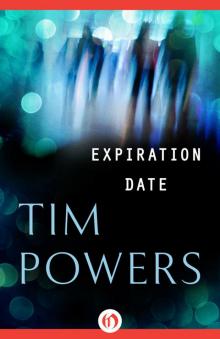 Expiration Date
Expiration Date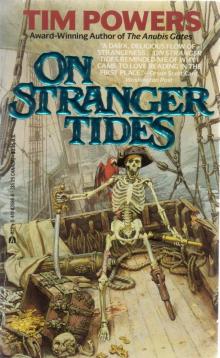 On Stranger Tides
On Stranger Tides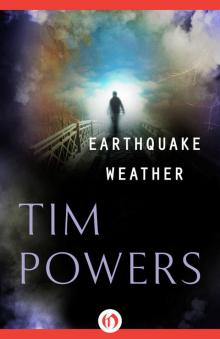 Earthquake Weather
Earthquake Weather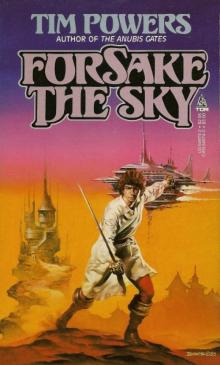 Forsake the Sky
Forsake the Sky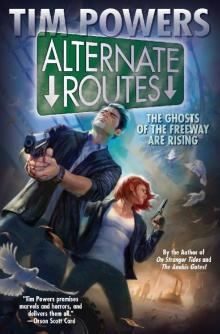 Alternate Routes
Alternate Routes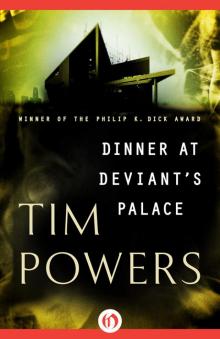 Dinner at Deviant's Palace
Dinner at Deviant's Palace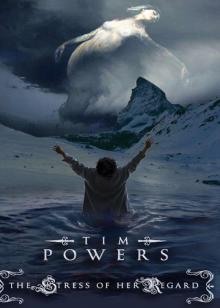 The Stress of Her Regard
The Stress of Her Regard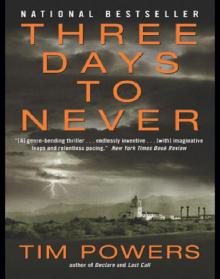 Three Days to Never: A Novel
Three Days to Never: A Novel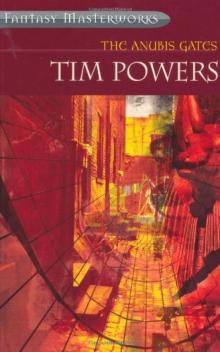 The Anubis Gates
The Anubis Gates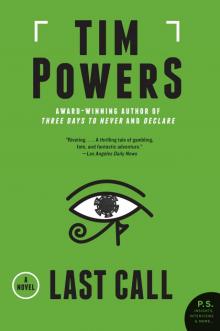 Last Call
Last Call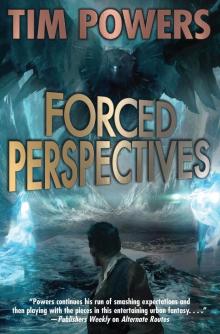 Forced Perspectives
Forced Perspectives Strange Itineraries
Strange Itineraries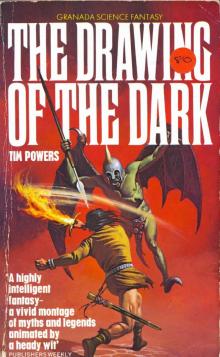 The Drawing of the Dark
The Drawing of the Dark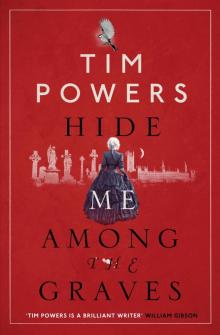 Hide Me Among the Graves
Hide Me Among the Graves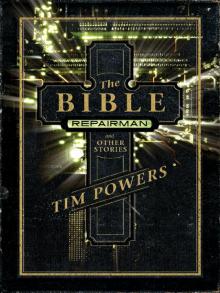 The Bible Repairman and Other Stories
The Bible Repairman and Other Stories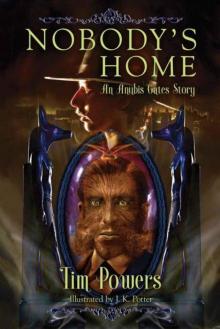 Nobody's Home: An Anubis Gates Story
Nobody's Home: An Anubis Gates Story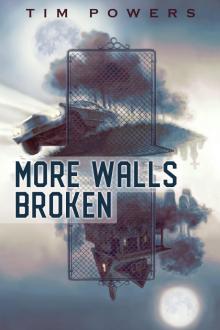 More Walls Broken
More Walls Broken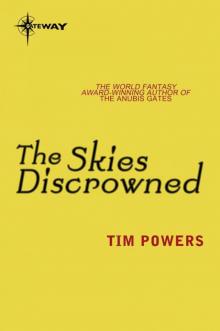 The Skies Discrowned
The Skies Discrowned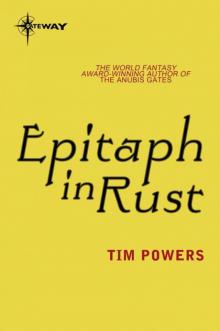 Epitaph in Rust
Epitaph in Rust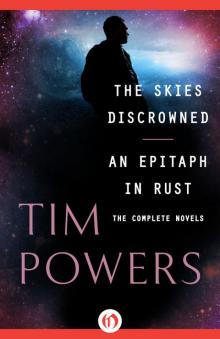 Skies Discrowned and An Epitaph in Rust
Skies Discrowned and An Epitaph in Rust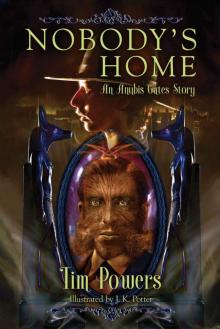 Nobody's Home
Nobody's Home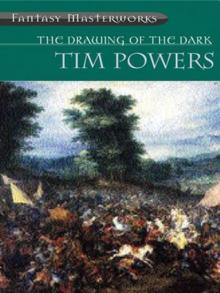 Drawing of the Dark
Drawing of the Dark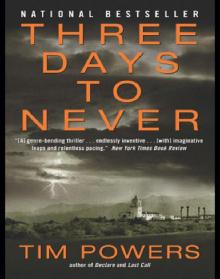 Three Days to Never
Three Days to Never